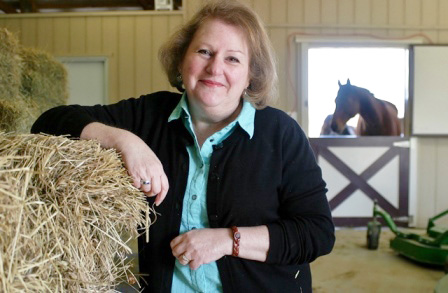Study Shows Music Helps Horses Perform Better
By Juliet M. Getty, Ph.D.
Researchers from Poland[i] set out to determine the effect of music played in the barn on the emotional state of race horses. Many horse owners have found that music has an apparent calming effect on fear, aggression, and overall stress. Race horses, in particular, have demands of increased cardiac activity and speed that may be improved through music exposure.
Forty 3-year-old Arabian horses were placed in a barn where they listened to specifically composed music[ii] for five hours each day. Their emotional state was assessed by measuring heart rates at rest, saddling, and warm-up walking. Racing performance and number of wins were also recorded. At the end of each month, for three months, data were compared to a control group of horses subjected to the same activity, without having listened to music.
The results of the study showed that the music positively impacted the emotional state and performance of treated horses, compared to the control group. What was so remarkable was that the effect was noticeable throughout every activity, even during the heightened excitement of being ridden at a gallop.
Even more noteworthy was the positive influence the music had after the second and third months, improving with each subsequent month, exhibited by the number of races won. Beyond three months, however, the impact leveled off, presumably because the horses became accustomed to the music.
Implications for your horses
Horses are individuals and respond to stress in a variety of ways. This study offers one approach toward helping your horse calm down and better respond to performance demands. All horses, not just athletes, can benefit from a relaxed, stress-free environment.
Increased amount of stall confinement, often seen with the onset of winter weather, can agitate many horses. Soft music, such as was used in this study (see endnote for more information), can be a useful tool in helping your horse cope with being indoors, as well as veterinary and farrier visits, travel, and other stressors.
[i] Stachurska, A., Janczarek, I., Wilk, I., and Kedzierski, W., 2015. Does music influence emotional state in race horses? Journal of Equine Veterinary Science, 35(5), 650-656.
[ii] Composed by Janet Marlow of Pet Acoustics, a specialist in music for animals. Her CD “Relaxation Music for Horses” can be purchased at horsesupplements.gettyequinenutrition.biz.
Juliet M. Getty, Ph.D. is an independent equine nutritionist with a wide U.S. and international following. Her research-based approach optimizes equine health by aligning physiology and instincts with correct feeding and nutrition practices. Dr. Getty’s goal is to empower the horseperson with the confidence and knowledge to provide the best nutrition for his or her horse’s needs.
Dr. Getty’s fundamental resource book, Feed Your Horse Like a Horse, is available in paperback as well as in hardcover, and Kindle versions. All except the Kindle version are available at www.GettyEquineNutrition.com. Print and Kindle versions are also available at Amazon (www.Amazon.com); The seven individual volumes in Dr. Getty’s topic-centered Spotlight on Equine Nutrition series are available with special package pricing at her website, and also at Amazon in print and Kindle versions.

Juliet M. Getty, Ph.D. is an independent equine nutritionist with a wide U.S. and international following. Her research-based approach optimizes equine health by aligning physiology and instincts with correct feeding and nutrition practices. Dr. Getty’s goal is to empower the horseperson with the confidence and knowledge to provide the best nutrition for his or her horse’s needs. Learn more at www.gettyequinenutrition.com.






